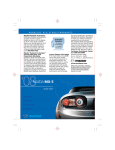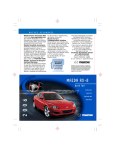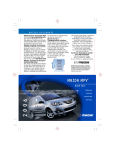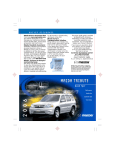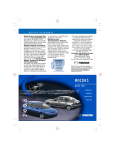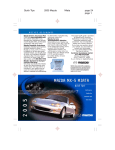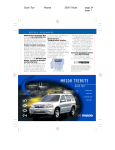Download Mazda 2006 MX-5 Owner`s manual
Transcript
DRIVER ASSURANCE Mazda Drivers Assurance Plan Check out www.mymazda.com, the website dedicated to you. Manage your maintenance records, receive valuable offers, see the latest accessories and much more! Mazda Roadside Assistance Exhilaration, liberation and inspiration are great reasons to drive a Mazda car, truck, SUV or minivan. In addition to all the other great standard features, you also get peace of mind, our Emergency Roadside Assistance Plan, it’s just a phone call away, 24 hours a day, 365 days a year, call 1-800-866-1998 Mazda ‘’bumper-to-bumper” Limited Warranty We design and build every Mazda to give you driving pleasure now and far down the road. We’re so confident in our quality that we cover the entire vehicle against defects in materials and workmanship for 48 months or 50,000 miles, whichever comes first Mazda Service Transportation Solution Being without your Mazda may put a crimp in your day, if you do ever have to take your Mazda in for repairs don’t worry, you’re covered. With the Mazda Transportation Solution, you will be given a loaner car at no charge when your Mazda vehicle is in for warranty repairs. For all the details, see your Mazda Dealer This Quick Tips® guide is provided by Mazda North American Operations to make your Mazda ownership experience more convenient. It is not intended to replace your Owner’s Manual. If you have any questions about your vehicle, you are invited to contact your local dealer. Or if you need additional help, feel free to call our Customer Assistance Center at 1-800-222-5500 Monday through Friday, 8 a.m.- 4 :45 p.m., Pacific 9 a.m.-5:45 p.m., Eastern/Central Unleaded Gasoline 91-octane recommended 12-gallon/ 48-liter tank ©2005 Calcar, Quick Tips® is a trademark of Calcar, made in USA 4/05 25.889M DOT Mazda North American Operations reserves the right to change product specifications at any time without incurring obligations. 9999-95-031C-06QT MAZDA MX-5 MIATA Quick Tips ® Reference Guide for 2006 Controls and Functions ® DRIVER’S VIEW 1 23 4 5 6 7 8 9 10 11 12 6 6 5 4 80 7 x1000r/min 100 13 14 15 16 6 6 31 120 140 2 3 60 F 0 1 E P R N D M 40 8 20 0 27 26 24 25 24 23 19 18 28 17 22 20 17 21 1. Power door locks*, see Locks 2. Power outside mirror switch, see Switches/ Interior Lights 3. Manual door locks, see Locks 4. Passenger air bag deactivation switch, see Getting Started 5. DSC Traction Control System*, see Instrument Cluster 6. Air vents Move vents to direct airflow 7. Audio control switches*, see Getting Started 8. Turn signal/lighting control lever, see Getting Started 9. Horn Press for horn 10. Air bag 11. Wiper/washer lever, see Getting Started 12. Cruise control*, see Getting Started 13. Audio system, see Audio Systems 14. Hazard warning switch Press on/off 15. Passenger air bag off indicator, see Getting Started 16. Climate control system, see Climate Controls 17. Bottle holder CAUTION: Use plastic bottles with caps, cups may spill when door is closed 18. Glove compartment 19. Gearshift lever, see Transmission 20. Parking-brake lever 21. Cup holders 22. Power window switches, see Switches/Interior Lights 23. Accessory socket 24. Steering paddle switches (A/T only)*, see Transmission 25. Tilt steering-wheel lever, see Getting Started 26. Hood release handle Pull to open partially 27. Remote trunk-lid release Press button to open trunk 28. Fuse panel *Denotes optional equipment Always check the Owner’s Manual for more operating information and safety features Driver’s View Getting Started GETTING STARTED 2 3 4 Getting Started Mazda MX-5 Miata Quick Tips® are designed to quickly familiarize you with some important features of your Mazda MX-5 Miata The Driver’s View tab is your index to the Quick Tips®, locate the item you would like to learn more about and then turn to the listed tab This Getting Started section contains important operating tips about your Mazda MX-5 Miata Items identified in blue text call out important information F 1 PASS AIRBAG ON E OFF 1 Always “ON” PASS Except AIRBAG CRS used Passenger’s seat air bag deactivation switch† Deactivate passenger’s seat air bag when using a child-safety seat To deactivate/activate: Insert ignition key or auxiliary key (Advanced keyless entry*) in switch (1), rotate to OFF/ON, remove key Passenger air bag off indicator illuminates when air bag is deactivated and ignition is on 1 Remote fuel filler release lever Located in rear compartment between seats Pull remote fuel-filler lid release lever (1) to open fuel-filler lid Behind seat storage Move seatbacks forward to access additional storage compartments, see Seats WARNINGS: When using a rear-facing infant-safety seat always set the passenger seat air bag deactivation switch to OFF position An infant is in serious danger of being injured or killed if front passenger air bag is deployed If you must install a forwardfacing child-safety seat in the front seating position, move vehicle seat as far back as possible and set air bag deactivation switch to OFF position Tire Pressure Monitoring System (TPMS)* Warning light illuminates on instrument cluster for a few seconds with ignition on If tire pressure is low, warning light illuminates with audible beep sound, adjust tire pressure to correct specifications, perform tire pressure adjustment before driving, a digital tire pressure gauge is recommended Flashing warning light may indicate malfunction, dealer inspection required Passenger air bag deactivation indicator light Front air bag deactivation indicator light provides current status of front passenger air bag and pretensioner system If total seated weight on front passenger seat is less than approximately 66 lb., front passenger air bag deactivation indicator light illuminates, air bag/pretensioner will not deploy/activate in an accident If the total seated weight is greater than approximately 93 lb., light does not illuminate, and the air bag/ pretensioner will deploy/activate in an appropriate accident, see Owner’s Manual *Denotes optional equipment † For other rare circumstances when passenger air bag can be shut off, refer to NHTSA guidelines Always check the Owner’s Manual for more operating information and safety features Getting Started Getting Started GETTING STARTED 4 Advanced 3 keyless entry/ start system* Advanced key must be carried 5 by driver to operate properly Refer to Owner’s Manual for additional instructions Advanced keyless system customization Your authorized Mazda Dealer can customize your system if desired with features such as auto-lock: After exiting the vehicle after driving, the car will automatically lock For additional information on customizable features, see Owner’s Manual 1 2 Passenger’s door request switch: Press (6) on passenger’s door; both doors unlock simultaneously 7 6 Trunk request switch: Press (7) on trunk lid, only trunk will open, Locking doors doors do not lock/unlock Driver’s/passenger’s door request Advanced key transmitter: switch: Press (6) once on either Press button (2) for driver’s door to lock both doors door; press again within a 3 Advanced key transmitter: seconds to unlock passenger’s door Press button (1); pressing again button (3) within a few seconds causes doors Press and hold for more than 1 second to to relock and horn to beep open trunk Unlocking doors/ Activating panic alarm opening trunk Driver’s door request switch: Press Panic alarm: Press and hold button (4) for more than 1 second; (6) to unlock driver’s door; press horn sounds, hazard warning again within 3 seconds to unlock lights flash; to stop, press any both doors remote button *Denotes optional equipment Starting engine Press start knob (8); when KEY indicator (green) illuminates on 9 8 9 instrument cluster; turn start knob (8) to START position to start engine Tip: Engine will not start if trunk is open and advanced key is placed in trunk Auxiliary key operation If advanced key cannot be used due to a malfunction or dead battery, use auxiliary key (5) to lock/unlock doors, trunk and to start vehicle To start vehicle: Remove start knob cover (8) by pressing both side release buttons (9) while pulling; insert auxiliary key into key cylinder and turn to start engine Tip: Do not place advanced key on or around dashboard, storage LOCK ON S TA RT C AC PUSH compartments such as glove box or in open trunk, engine may not start or warnings may activate Turning off engine Turn start knob to ACC position to turn engine off, push in and turn start knob to LOCK position Tip: Vehicle battery may be discharged if start knob is left in ACC position Always put vehicle in Park (P), set parking brake and turn start knob to LOCK position when exiting vehicle System operation warnings KEY indicator light flashes (green) indicates advanced key transmitter battery power is low KEY indicator light illuminated continuously (red) indicates system malfunction, and auxiliary key should be used, have vehicle inspected at an Authorized Mazda Dealer as soon as possible Tip: When using advanced keyless system, system will beep as confirmation of lock/unlock requests, system will also beep if start knob is left in ACC position, advanced key has been left in vehicle or if advanced key is removed from vehicle while vehicle is running For additional system operation warnings, see Owner’s Manual Replacing battery See Owner’s Manual for complete instructions Cautions on use To avoid damage to advanced key, DO NOT SUBJECT to severe impacts, liquids or place heavy objects on advanced key or leaving advanced key exposed to direct sunlight or high temperatures See Owner’s Manual for all cautions and warnings Always check the Owner’s Manual for more operating information and safety features Getting Started Getting Started GETTING STARTED 1 23 4 1 2 Turn signal/lighting control lever OFF = Lights off = Tail, parking and dashboard lights on: Rotate knob (1) to first notch = Tail, parking, dashboard and headlights on; rotate knob (1) to second notch High beams on/off: Push lever (2) forward/pull lever back to original position To flash high beams: Pull back lever (2) slightly and release Turn signals right/left: move lever up/down = Fog lights* on: Rotate (3); functions only with headlight low beams on Tip: Headlights will turn off, parking lights remain on, if lights are left on and switch is in lock position or key removed Windshield wiper/ washer lever Intermittent wiper: One click down Normal wiper speed: Two clicks down Fast wiper speed: Three clicks down Single wipe: Push lever up Wash and wipe: Pull lever (4) toward you and hold; washer and wipers will be activated until lever is released 5 67 3 4 ON OFF MODE VOL+ RES/+ – SET/– CANCEL 8 Steering-wheel audio controls* To increase/decrease volume: Press up/press down switch (1) Press (2) to mute Press (3) to select AM, FM1, FM2, CD, SIRIUS* radio mode Press up/press down (4) to seek next/previous preset radio station/CD track Press and hold up/down (4) to seek radio stations in AM, FM1, FM2 Cruise control* Operates above 19 mph Press ON/OFF switch (5) to enable/disable To set speed: Press switch (6) down and release To increase set speed: Press switch (6) up and release at desired speed To decrease set speed: Press switch (6) down and release at desired speed To cancel: Tap brake or clutch pedal (manual transmission) or press CANCEL switch (7) Tilt steering-wheel lever Pull lever (8) down to unlock column, adjust angle of column WARNING: Do not adjust steering-wheel while driving *Denotes optional equipment Always check the Owner’s Manual for more operating information and safety features Getting Started Instrument Cluster INSTRUMENT CLUSTER GAUGES AND CONTROLS 1. Dashboard illumination control, Rotate to dim/brighten 2. Tachometer Avoid red zone 3. Turn signal/hazard warning on 4. Engine oil pressure gauge If outside normal range, stop vehicle safely and turn off engine, check oil level See Owner’s Manual for scheduled maintenance Tip: Needle fluctuates with engine RPM, this is normal 5. Speedometer 6. Odometer/trip odometer selector Press to select odometer or trip odometer A/B; press and hold to reset selected trip odometer 4 3 3 5 2 1 L 100 80 60 100 2 1 E 11 10 P R N D 0 M 40 140 220 80 F 120 140 160 180 km/h 120 200 mph 7 3 6 F 5 4 x1000r/min 6 240 60 40 8 A 9 7. Coolant temperature gauge If above normal range, stop vehicle safely and turn off engine; check coolant level when safe 8 0.0 20 H 20 0 0 C 8 7 8. Odometer/trip odometer display 9. Shift/gear position indicators* 10. Low fuel indicator 11. Fuel gauge 12-gallon/48-liter tank WARNING LIGHTS • • Cruise control* on Amber light: Cruise control system activated Green light: Cruising speed set; see Getting Started High beams on, see Getting Started • Immobilizer system on, see Locks • Check engine Dealer inspection required • Air bag readiness If light flashes or stays on, the air bags may not operate in an accident; dealer inspection required • Brake system Parking brake on/low brake fluid • AT Automatic transmission warning light* • Charging system Possible alternator or charging system malfunction, dealer inspection required • Anti-lock Brake System (ABS)* Indicates ABS malfunction, dealer inspection required • Door ajar • DSC OFF Dynamic Stability Control* off • Tire pressure monitoring system*, see Getting Started • Always fasten seat belts • FLAT TIRE Flat tire warning light* Flat tire or system malfunction, dealer inspection required • KEY*, see Getting Started • TCS/DSC indicator light* Flashes when traction control or stability control is functioning, steady light indicates malfunction Enhances traction and safety by regulating engine and brake torque TCS/DSC light may occasionally flash while driving, this indicates that the TCS/DSC was performing a correction to help maintain your best vehicle control, if TCS/DSC light remains on, see your Mazda Dealer *Denotes optional equipment Always check the Owner’s Manual for more operating information and safety features Instrument Cluster Locks LOCKS Key Operates ignition and all locks Tip: Use key number plate to purchase a new key; store in a safe place separate from vehicle 1 Retractable key* To fold/unfold: Press release button (1) Auxiliary key* See Getting Started 1 2 3 4 5 Remote keyless entry system* Functions only with ignition in OFF position To lock doors: Press button (2); pressing again within a few seconds causes doors to relock and horn to beep To unlock: Press button (3) for driver’s door; press again within 3 seconds to unlock passenger’s door Press and hold button (4) for more than 1 second to open trunk Panic alarm: Press and hold button (5) for more than 1 second; horn sounds, hazard warning lights flash; to stop, press any remote button 2 Advanced keyless entry/ start system/auxiliary key* See Getting Started Immobilizer system Prevents engine from running unless coded key is used, see Owner’s Manual WARNING: Never leave children unattended with key in vehicle L R TRUNK OPENER AU TO Manual door locks To lock/unlock: Push button (1) into handle/pull toward you Power door locks* Both doors can be locked/unlocked using power door lock switch (2) or by using key in driver’s door To unlock driver’s door: Turn key toward the front of vehicle To unlock both doors: Turn key and hold in unlock position for more than 1 second To lock both doors: Turn key toward the back of vehicle OFF ON Remote trunk-lid release lock-out Switch in ON position, remote trunk release functions normal; OFF position disables system; switch located in trunk, see Trunk *Denotes optional equipment Always check the Owner’s Manual for more operating information and safety features Locks Switches/ Interior Lights SWITCHES/INTERIOR LIGHTS 1 L R AUTO ON DOO R OFF 2 Power windows Operate only with ignition on To open/close: Push down/pull up front of switch Press driver window button down completely once for one touch auto down Dual power mirrors Operates in accessory mode or with ignition on To adjust left/right mirror: Push selector switch (1) left/right, press switch (2) in direction of desired movement Dome light ON = Light always on OFF = Light always off DOOR = Light on when a door is open M (Sport A/T manual shift mode)* N Move shifter from D to M to engage M D manual shift mode, M will be illuminated on shift position indicator located in the instrument panel Manual shifting of transmission is achieved by moving shifter back to upshift and forward to downshift, move shifter from M to D to engage automatic shift mode Tip: You can also shift using steering wheel controls To upshift: Tap either up switch toward you To downshift: Tap either down switch away from you Gear indicator (A/T only)* Illuminated numeral of gear indicator located in the instrument panel displays current gear in Automatic and Manual shift modes P R Automatic transmission* P = Park To move gearshift from Park: Press firmly on brake pedal, then move gearshift to gear selection R = Reverse N = Neutral No gear engaged D (Overdrive) For normal driving: Shifts through all forward gears automatically *Denotes optional equipment 5-speed 6-speed* Manual transmission Depress clutch pedal to start engine and change gears Tips: Do not shift into 1st above 20 mph or clutch failure could occur Resting your foot on the clutch pedal while driving and using the clutch to hold your vehicle at a standstill while waiting on a hill may reduce clutch life Always check the Owner’s Manual for more operating information and safety features Transmission Seats SEATS Manual controls 1. Fore-aft adjustment Lift lever and hold, slide seat, release lever 2. Safety belt buckle 3. Seatback angle To adjust: Lift and hold lever, lean forward or backward, release lever Tip: Move seatbacks forward to access additional storage compartments Tip: Side-impact air bags deploy from outboard side of driver and front passenger seatbacks WARNINGS: Do not adjust seats while driving Safety belts must always be worn when vehicle is in motion All air bags are supplemental and do not replace safety belt usage Always wear your safety belt and properly secure children and set passenger side air bag deactivation switch to OFF position 2 3 1 Safety belt emergency locking mode Belts lock only on hard acceleration, braking, cornering or impacts of about 5 mph or more Automatic locking mode (front passenger safety belt only) Must be used when installing child-safety seat To activate: Pull belt fully out of retractor, allow belt to retract until click is heard; belt will only tighten To disengage: Unbuckle belt and allow belt to retract fully Child-safety seat To install in passenger seat: Move seat as far back as possible; use dual locking mode retractor safety belt; see Owner’s Manual for proper installation of child seat and LATCH system instructions WARNING: Use age appropriate child restraints, see Owner’s Manual and state or province laws WARNINGS: When using a rear-facing infant-safety seat always set the passenger seat air bag deactivation switch to OFF position An infant is in serious danger of being injured or killed if front passenger air bag is deployed If you must install a forward-facing child-safety seat in the front seating position, move vehicle seat as far back as possible and set air bag deactivation switch to OFF position Always check the Owner’s Manual for more operating information and safety features Child Seats Climate Controls CLIMATE CONTROLS OP E 1 N 2 3 DE MO A/C C MODE 6 1. Airflow selector = air to dash/waist, open mode = air to dash/waist/floor, open mode = air to waist/floor, open mode = air to dash = air to floor = air to windshield and floor A/C compressor is on = defrost, air to windshield A/C compressor is on Tip: Select OPEN MODE position when lowering convertible top for best comfort WARNING: When using position always set temperature control to hot or warm to prevent glass fogging H OFF 5 4 2. Temperature control Rotate knob counterclockwise/ clockwise for cooler/warmer 3. Fan control Rotate knob counterclockwise/ clockwise to decrease/increase fan speed, turn to OFF to shut system off 4. A/C Air conditioning* Press to turn on/off Tip: Use A/C to dehumidify air 5. Air intake control Press to select fresh air (indicator light off)/recirculated air (indicator light on) WARNING: Do not use recirculated air mode in cold or wet weather; windows could fog and hamper vision 6. Rear window defogger Press to activate/deactivate Control positions for maximum defrost Fan to maximum, temperature to maximum hot, airflow selector knob to Tips: When selected, air is dried by A/C compressor operation when outside temperature is above 39°F To help prevent windshield fogging in humid weather, select To prevent moisture buildup, never drive with system off with convertible top up *Denotes optional equipment Always check the Owner’s Manual for more operating information and safety features Climate Controls Audio Systems AM/FM STEREO/CD/MP3 6. CD Press to play CD 7. Display 8. CD eject button 9. Tune/Audio/Text Control Radio: Rotate counterclockwise/clockwise for lower/ higher frequency Audio: Press to select ALC or AudioPLT*/BASS/TREB/FADE/ BAL/BEEP Rotate right/left to adjust selected feature Text*(MP3): Rotate right/left to display titles Tip: Automatic Level Control (ALC) automatically adjusts audio volume depending on vehicle speed 10. Memory preset buttons To set: Tune to station, press and hold until beep sound is heard 3 4 FM/AM 2 5 6 SAT CD 7 MEDIA 8 LOAD L PUSH POW ER TU VO NE H PUS AUDIO CO . NT 1. Power/Volume Press to turn on/off; rotate to increase/decrease volume 2. LOAD CD: When LOAD button is pressed, CD will load and play even if CD eject button has been previously pressed CD changer*: To load multiple discs: Press and hold LOAD (2) until beep sound is heard; insert CD when “In” is displayed To eject disc: Press Eject (8) To eject specific disc: Press and hold Eject (8) until beep sound is heard; within five seconds press the desired tray number 1-6 (10) 3. FM/AM Press to turn radio on and select between FM1/FM2/AM station preset buttons (10) 4. CD slot 5. SAT*, Satellite ready capability 9 1 TEXT 19 1 DISC 18 2 DISC 3 RPT 4 PROG/RDM 5 6 SEEK TRACK CLOCK SCAN APC DISP ESN AUTO-M 17 16 15 14 13 12 10 11 Tip: Insert single CD into slot, auto-loading function will set CD and begin play without pressing LOAD button 11. Reverse /Fast forward Press to reverse/fast forward through a track 12. Auto-Memory Press and hold until a beep sound is heard; system automatically scans and temporarily stores six strong stations in each band; press again to switch to another preset station 13. Scan Radio: Press to sample strong stations, press again to stop at current station CD/MP3: Press to play first few seconds of each selection, press again to stop at current selection 14. Random* Press to play CD/MP3 selections in random order 15. RPT Press to replay current CD/MP3 selection 16. DISP CD/MP3: Press repeatedly to scroll through displays 17. Clock To set: With ignition in ACC or ON position, press top of switch (17) until beeper sounds and time flashes; press top of switch (18) to set hour, press bottom of switch (18) to set minutes, press top of switch (17) to start clock 18. SEEK/TRACK/APC Radio: Press / to automatically seek higher/ lower frequency CD/MP3: Press / to select next track/beginning of current track 19. Disc * Press to skip to next/previous CD *Denotes optional equipment Always check the Owner’s Manual for more operating information and safety features Audio Systems Convertible CONVERTIBLE Convertible top operation Tip: Always lower side windows before lowering or raising convertible top To lower: Stop vehicle in a safe place and park on a level surface; set parking brake; lower side windows; remove items from rear storage area; push unlock button (1) while pulling top latch (2) rearward, continue to pull top latch back completely; pull front of top rearward to release from windshield header If lowing top from inside vehicle, use either handle (3) to lower If lowing top from outside vehicle, grasp side of top, near windshield header (4) to lower Fold back top and press firmly on front of top to securely lock in lowered position Raise wind blocker (6) if desired Tip: If top is hard to lower; raise top slightly; then slowly lower it while pressing upper part of rear glass with your hand To raise: Stop vehicle in a safe place and park on a level surface; set parking brake; lower side windows; lower wind blocker (6); pull unlock lever (5) to release top from lowered position If raising top from inside vehicle, grasp either handle (3) to raise If raising top from outside vehicle, grasp side of top near windshield header (4) to raise Push lever on top latch up until lock button (1) clicks and top latch is securely locked WARNING: If red indicator is visible on unlock button (1), top is not securely latched 2 1 3 3 4 6 5 Always check the Owner’s Manual for more operating information and safety features Convertible Trunk TRUNK 6 5 31 4 2 Trunk 1. Tool bag Contains lug wrench, tow hooks and jack handle 2. Jack To remove: Turn knob counterclockwise, open cover, turn wing bolt counterclockwise, remove jack Tire economy and tips Check pressure at least monthly when tires are cold Maintain correct 4-wheel alignment and tire balance; rotate tires at 7,500-mile intervals; see Owner’s Manual for rotation chart Tire pressure Decal on the edge of the driver’s door jamb provides tire pressure information Tire chains*† Tire chains can damage aluminum wheels; use on steel wheels only Tips: Use only genuine Mazda tire chains; install only on rear tires; install as tightly as possible and retighten periodically Never exceed 30 mph with tire chains 3. Instant Mobility System emergency flat tire repair kit (IMS)* Your Mazda MX-5 Miata is not equipped with a spare tire, if tire repair is required, repair tire with emergency flat tire repair kit, see Owner’s Manual for instructions If equipped with optional runflat tire, see Owner’s Manual 4. Lock To lock/unlock: Insert key and turn counterclockwise/clockwise 5. Remote trunk-lid release lock-out, see Locks 6. Trunk light Tip: Trunk can be opened using remote keyless entry system Anti-lock Brake System (ABS)* ABS automatically reduces hydraulic pressure to any wheel on the verge of locking up You may feel a slight pulsing of the brake pedal and hear a clicking noise; this tells you the ABS is functioning properly; increase pressure on pedal for maximum braking Tips: Maintain constant pressure on the brake pedal Do not pump the brakes ABS self test A self-diagnostic test is performed when vehicle starts to move; you may feel some brake pedal pulsation and hear some noise, this is normal 7 7. Trunk release lever Allows you to escape should you become locked in trunk To open: Slide lever in direction of arrow, lever will glow if it has been exposed to light Gas cap After filling vehicle with gasoline, fully reinstall gas cap by turning clockwise until a clicking sound is heard, if gas cap is not fully installed, Check Engine light may come on For more information on Check Engine light, see Owner’s Manual *Denotes optional equipment † See Owner’s Manual Always check the Owner’s Manual for more operating information and safety features Driving Tips Under Hood UNDER HOOD 1 2 3 4 12 1110 9 8 7 5 6 2.0-liter 4-cylinder Tip: Check all fluids with vehicle parked on a level surface Maintenance notes: Rotate tires every 7,500 miles or sooner if needed Replace cabin air filter every 25,000 miles or 24 months Inspect engine valve clearance every 75,000 miles Replace spark plugs every 75,000 miles Replace (FL22)* engine coolant at 120,000 miles 9. Hood latch 1. Windshield washer Push to right to release hood fluid reservoir Refill with windshield 10. Power steering fluid washer fluid reservoir Check with engine off and 2. Battery at operating temperature 3. Engine oil filler cap, Level should be between SAE 5W-20 MIN and MAX 4. Engine oil dipstick 11. Cooling system cap Check with engine off and Do not remove if engine at operating temperature is running or hot Engine oil should be between FULL and LOW marks on dipstick 12. Engine coolant reservoir Check when engine is cold; 5. Brake/clutch* fluid fluid level should be between reservoir the FULL and LOW marks If brake/clutch* fluid level on reservoir is low, have your vehicle inspected by your nearest WARNING: Never remove Mazda dealer cooling system cap while engine is running or hot; 6. Fuse block you could get burned 7. Hood support rod 8. Air filter 7,500 miles A 15,000 miles A 22,500 miles A 30,000 miles A B 37,500 miles A 45,000 miles A 52,500 miles A 60,000 miles A B 67,500 miles A 75,000 miles A 82,500 miles A 90,000 miles A B F F C E F D C F F E F Tip: For severe driving conditions, Owner’s Manual recommends changing oil and filter at 5,000† miles *Denotes optional equipment † See Owner’s Manual Break-in period First 600 miles: Avoid heavy braking and acceleration; drive at varying road and engine speeds A. Change: Engine oil/replace filter Lubricate: Locks and hinges B. Inspect: Fuel lines and hoses, idle speed, brake lines and hoses, steering operation and linkages, front suspension ball joints, driveshaft dust boots, chassis and body bolts C. Inspect: Drive belts (tension) Replace: Air filter D. Inspect: Hoses and tubes for emission system Replace: Engine coolant (other than FL22), manual transmission oil, rear differential oil E. Inspect: Exhaust system and heat shields F. Inspect: Disc brakes Always check the Owner’s Manual for more operating information and safety features















